Where do IU trustee candidates stand on protests, grad workers union, Whitten administration
Editor's note: This story has been updated to reflect that only one alumni trustee position is up for election this year, not three.
Ahead of next month’s alumni trustee election, The Herald-Times asked the 12 candidates running for the open alumni trustee position to weigh in on some of the most pressing and controversial issues from the past academic year at IU. These include the recent protests and arrests at Dunn Meadow, the ongoing push for union recognition from the IGWC and growing calls for the resignation and/or termination of IU President Pamela Whitten.
What to know about the June 1 alumni trustee election
The alumni trustee positions are the only three elected positions of IU’s nine-member Board of Trustees. Any alumni of IU’s programs, including undergraduate and graduate programs, are eligible to vote in the election by mail or online at alumni.iu.edu/events/trustee-election. Voting begins June 1 and closes at 10 a.m. June 28.
Elected candidates begin their term on July 1, immediately following the election. All IU trustees except the student trustee serve three-year terms (student trustees serve two years).
The IU Board of Trustees is responsible for many of the financial and operational decisions made at IU, including the appointment of IU’s president, policy changes, financial commitments and more. Questions like revision of the Dunn Meadow outdoor structures policy, recognition of the graduate worker’s coalition and the contracts of IU’s administration fall under the purview of the board.
In early 2024, an earlier version of the now-enacted Senate Enrolled Act 202, which overhauled the tenure review process at Indiana’s public colleges, recommended transforming two of the three alumni trustee positions into appointments from the state’s Senate president and House speaker, leaving only one democratically elected trustee. This provision was struck down as SEA 202 moved through the legislative session.
The questions we asked
Questions were asked in a list format, but some candidates opted to respond with general statements that addressed certain points. Some replies were one to two paragraphs total, while some candidates provided pages of responses. The questions asked are as follows:
Calls for the resignation of IU President Pamela Whitten and Provost Rahul Shrivastav have intensified in recent months, with a vote of no confidence earlier this month and a rally that drew hundreds calling for Whitten and Shrivastav’s resignation or termination. What is your response to the growing dissent within the campus community? Would you advocate for any changes in approach or leadership at IU?
Since April 25, more than 50 protesters, most of them students, have been arrested and some injured by Indiana State Police troopers. Many alumni, faculty and community members have criticized IU’s response to these student protests, saying IU/ISP needlessly escalated the situation. Do you believe the current IU administration acted reasonably? How would you encourage IU leaders to respond to future student protests?
Critics of IU’s response say a change to Dunn Meadow’s outdoor policy and the use of “structures” ought to be decided by the Board of Trustees. If elected, would you advocate for the board to review IU’s recent policy change? Would you support any amendments or revisions?
Earlier this month, the Indiana Graduate Workers Coalition went on strike for the first time since 2022, asking IU again to formally recognize the group as a union. Trustees declined to recognize the union in 2022. How would you approach discussions/negotiations with the IGWC if elected to the board?
There’s been growing concern from faculty and students that IU is losing principles of “shared governance” due to some unilateral decisions from the administration that typically involve faculty input. How would you use your position as a trustee to guide a democratic approach at IU?
Are there any other statements you’d like to provide about your candidacy for alumni trustee?
Only one candidate, current trustee Jeremy A. Morris, did not supply a comment after several attempts to contact him.
The candidates’ responses, alongside a brief biography, are provided, unedited, below.
Jill Maurer Burnett
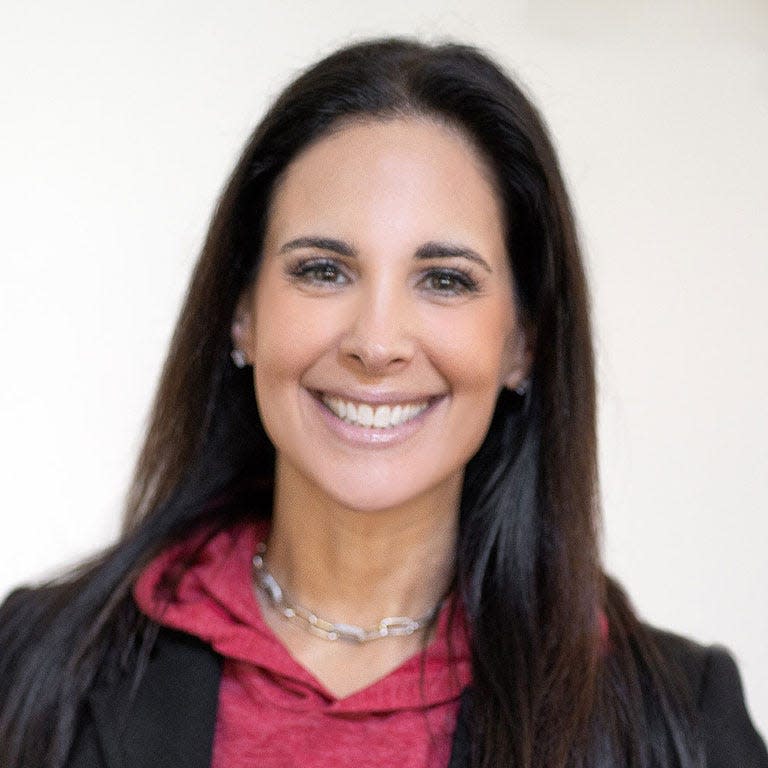
About: Jill Maurer Burnett is a 1997 graduate and the current president of the Maurer Family Foundation (the family of Michael S. Maurer, the namesake for IU's Maurer Law School). Maurer also serves as a board member for the Indiana based group Discovering Broadway, the Indianapolis Zoo, and the Hooverwood Living nursing home. Maurer has served for 20 years as the planner for Mickey's Camp, an adult summer/recreational camp in Indianapolis.
Burnett's statement:
Students on our IU campuses should be protected, seen and heard by our administration. We must strive to continue to raise IU’s high standards in order to attract well-rounded, capable students who graduate and impact the world – their time at IU being just the beginning of their successes. The role of trustees should be integral to this undertaking. I will take these responsibilities seriously.
I expect to learn a great deal if I am privileged to serve as a trustee. Student and faculty protestors must follow the rules and regulations of IU in addition to the laws of our city and state and if they fail to do so, they should expect the prescribed adverse consequences and ramifications.
Raymond E. Dusman
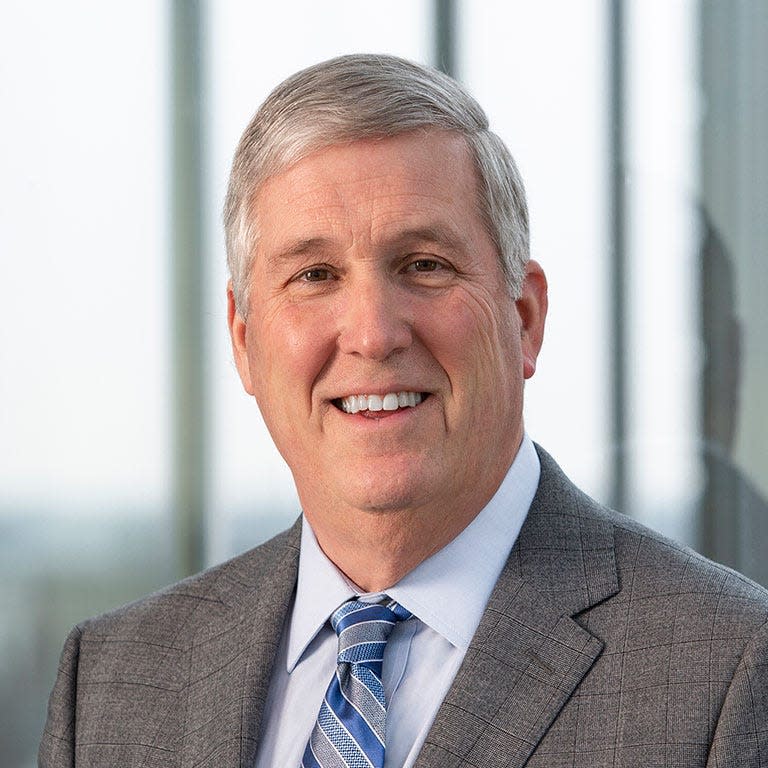
About: Raymond E. Dusman is a 1979 graduate and cardiologist based out of Fort Wayne. Dusman is a member of the Indiana chapter of the American College of Cardiology and currently serves as the president for physician and clinical enterprise at Parkview Health.
Dusman's statement:
While the questions are timely, I do not have access to the necessary background information, including an understanding of the discussions that occurred at the board level and with stakeholders, the various decision points considered, and available options that factored into actions. I do not wish to speculate or make assumptions that are incorrect. I can state more general beliefs and principles below.
The campus should be a safe environment to openly discuss, debate, and compromise on issues that matter to students, faculty, and administration. Safety is a foremost consideration for all parties. The board endorsed IU 2030, a strategic plan developed with the goals broadly based on student success, affordability, research, and service. The principles underlying the plan include a focus on innovation, respect of diverse identities and perspectives, integrity, excellence, and fiscal responsibility. Achievement of these goals can only occur through close collaboration between administration, faculty, and the board. Challenges in education have made reform an imperative and by necessity requires more rapid change to be successful. These challenging times should be a catalyst for all stakeholders to come closer together for the common good of the students, longer term success of the university, and statewide impact. Amongst many opportunities, the university is in an excellent position to further expand its research footprint, leverage the expertise of the nation’s largest medical school, and build successful career paths for its students.
As the only physician on the ballot and, if elected, similarly on the board, I feel that my experience and background can support the university and board well especially in the areas of science and healthcare education, training, research, and innovation. This will help prepare for a sufficient and necessary future workforce and advance the goals of the university.
Andrew Flittner
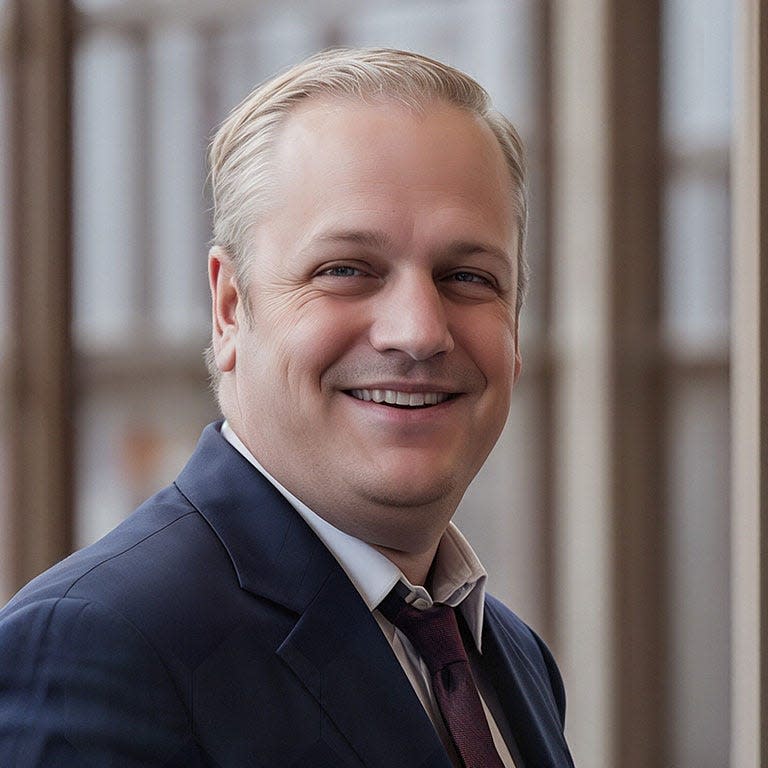
About: Andrew Flittner is a 2005 graduate and currently serves as principal at Independent Senior Insurance in Indianapolis. Flittner earned a bachelor's degree in management, a master's in public health, a juris doctor and a master's in public administration from IU Bloomington.
Flittner's statement:
In light of the recent vote of no confidence from the Indiana University staff against the current president, it's important to understand the context and implications of this action. A vote of no confidence is a formal vote by a group expressing their belief that a leader lacks the suitability to hold a position of authority. This vote by the Indiana University staff signifies deep concerns and dissatisfaction with the leadership and direction under the current administration, particularly regarding decisions that have impacted the university’s community engagement.Context and Summary of Events:The vote of no confidence arose after a series of administrative decisions perceived to undermine the university's mission and the welfare of its community members. Specific grievances cited included placing a staff member on leave after he allegedly failed to follow university policy when booking a room for an pro-palenstinian student group. Some staff were also critical of her response on behalf of the University in response to the Israeli and Palestinian conflict that is currently happening. These actions prompted a portion of the staff to question the leadership’s effectiveness and to call for more accountable governance.Addressing this moment through my campaign pillars—Academic Excellence, Accessibility, and Advocacy—provides a clear framework for how I intend to lead if elected to the Board of Trustees:Academic Excellence: The vote signals a need for a renewed commitment to IU’s academic mission. I aim to ensure that academic programs and faculty are not only supported but are pivotal in decision-making processes, enhancing our university's reputation and educational outcomes. We must attract and retain the staff who are experts in their respective fields. To do so means that we will have staff of varying viewpoints and political leanings. As an individual, I cannot support any person who is pro-terrorism or anti-jewish. As a leader, I welcome diverse viewpoints and encourage collaboration and healthy debate. However, I cannot support the presence of any group that threatens the safety of our Jewish students. Healthy debate and respect of varying viewpoints is critical to a productive workplace culture where staff of differing backgrounds enjoy their roles and wish to remain employed at Indiana University. Accessibility: The concerns leading to the vote highlight the necessity for greater inclusivity in our university's decision-making processes. If elected, I would advocate for enhanced transparency and communication to ensure all community members can contribute to and understand the decisions that affect them. Fewer than 30% of eligible staff attended the meeting and cast a vote. As a trustee, I would advocate to hear the voice of this 30% as well as the other 70% to better understand the issue and include more voices in the decision making process. Protesters should have access to campus but should not be allowed to set up encampments. Protests should be allowed with reasonable standards that do not include setting up structures on campus. Advocacy: This vote is a call for stronger representation and advocacy for our staff and faculty. I will strive for open lines of communication between the administration and the university community, ensuring that concerns are not only heard but actively addressed, fostering a collaborative environment. I would advocate for the Indiana Graduate Workers Coalition to have a voice but cannot at this time support their unionization efforts without more information.The vote of no confidence is a strong message on behalf of Indiana University staff, but when only 30% of staff are participating there are additional voices that must be considered. It presents an opportunity for transformative change that can only be achieved by recommitting to our core values and principles. As a candidate for the Board of Trustees, I am dedicated to turning this challenging moment into a stepping stone for future success and stability.Thank you for your engagement and support.
Phillip J. Fowler
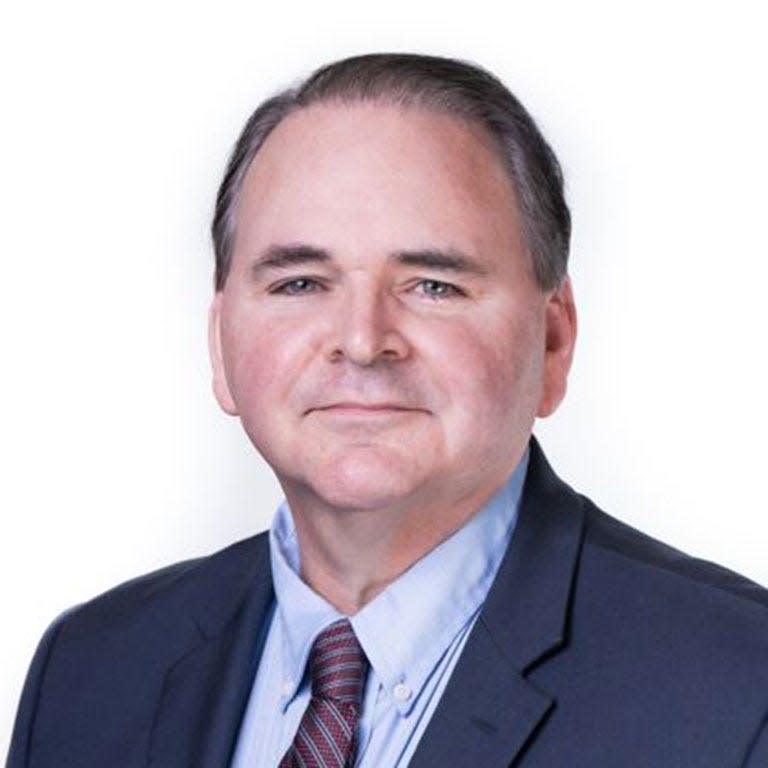
About: Phillip Fowler is a 1994 graduate and currently serves as senior vice president and general counsel at the Indiana Economic Development Corp. Fowler earned a juris doctor from Vanderbilt University and has previously served as an attorney and partner at Indianapolis-based law firms.
Fowler's statement:
Calls for the resignation of IU President Pamela Whitten and Provost Rahul Shrivastav have intensified in recent months, with a vote of no confidence earlier this month and a rally that drew hundreds calling for Whitten and Shrivastav’s resignation or termination. What is your response to the growing dissent within the campus community? Would you advocate for any changes in approach or leadership at IU?
The Bloomington faculty’s vote of no confidence in President Whitten is deeply concerning. For IU to function best, our administration and faculty need not agree on every issue, but there does need to be collaboration and some level of mutual respect between them that is apparently lacking. Conflict resolution has been at the core of my practice as a lawyer for much of my career, and if elected as Trustee I would use that experience to determine how the relationship between our current leadership and the Bloomington faculty can be improved.
Since April 25, more than 50 protesters, most of them students, have been arrested and some injured by Indiana State Police troopers. Many alumni, faculty and community members have criticized IU’s response to these student protests, saying IU/ISP needlessly escalated the situation. Do you believe the current IU administration acted reasonably? How would you encourage IU leaders to respond to future student protests?
I fully support the exercise of free speech in a peaceful and lawful manner. Given the unexpected violence we have witnessed at all types of public gatherings across the country in recent years, having a police presence was probably a prudent decision. Of course, physical force should be used only when necessary, and the least amount of force necessary should be used when it is required.
Critics of IU’s response say a change to Dunn Meadow’s outdoor policy and the use of “structures” ought to be decided by the Board of Trustees. If elected, would you advocate for the board to review IU’s recent policy change? Would you support any amendments or revisions?
I understand the concerns about the timing of the policy change. Ultimately, all of IU’s policies are subject to review by the Board of Trustees. If elected, I would encourage the Board to review the policy, but I wouldn’t want to prejudge whether the change in the policy was advisable without first speaking to my fellow Trustees and the ad hoc committee that adopted it.
Earlier this month, the Indiana Graduate Workers Coalition went on strike for the first time since 2022, asking IU again to formally recognize the group as a union. Trustees declined to recognize the union in 2022. How would you approach discussions/negotiations with the IGWC if elected to the board?
As I was not involved in the 2022 decision, I would be happy to review the issue if elected Trustee. The first step in the process would be to speak directly to the coalition’s leadership to better understand the concerns that are driving their push toward unionization.
There’s been growing concern from faculty and students that IU is losing principles of “shared governance” due to some unilateral decisions from the administration that typically involve faculty input. How would you use your position as a trustee to guide a democratic approach at IU?
I value the input of both faculty and students as they obviously have a stake in the outcomes of the decisions the Board makes. Better communication with the interested parties leads to better decision-making, and in this case might help to bridge the current gap between the Bloomington faculty and the current leadership. I would be willing to meet regularly with faculty leadership to ensure that I understand their positions and perspectives.
Are there any other statements you’d like to provide about your candidacy for alumni trustee?
Leadership is always important, even more so in trying times like IU is facing now. Leadership is not about reiterating buzzwords and catchphrases. Leadership is having the diligence to fully examine the causes of our problems, the wisdom to accept others’ input, the experience to choose the best solutions, and the integrity to make the tough decisions and implement them in a fair and impartial manner. If elected, I will do my best to help lead IU to a brighter future. To learn more about me and my candidacy, please visit fowlerforiutrustee.com.
Robin A. Hall
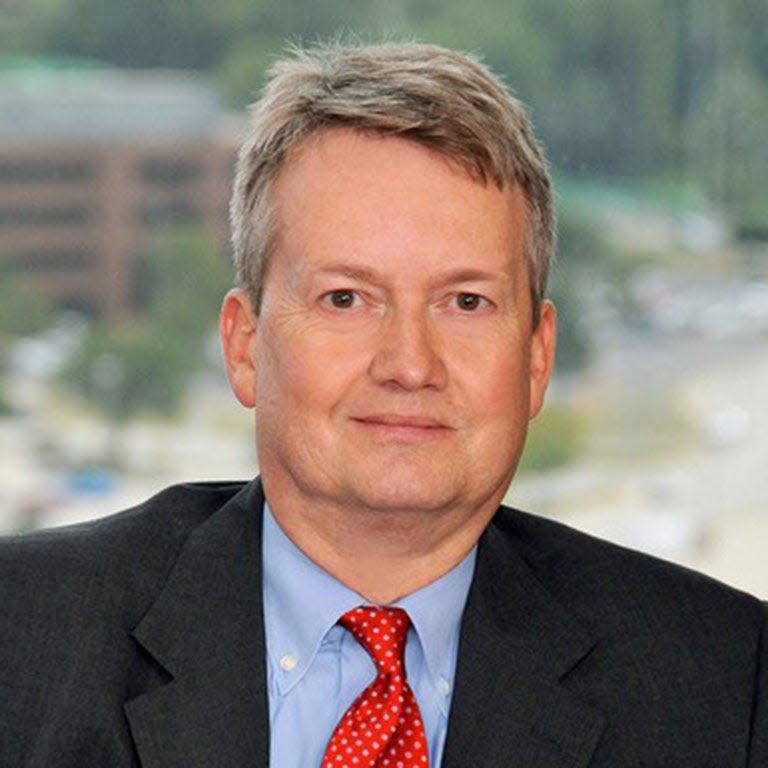
About: Robin A. Hall is a 1980 graduate and currently serves as principal and executive management director of Premier Wealth Advisors in Indianapolis, a wealth management firm he founded in 2005. Hall is a graduate of the Kelley School of Business and has previously worked for Merrill Lynch and STAR Financial Bank. Hall pledges to serve a single, three-year term and to "not to accept any compensation, stipends or reimbursements of any kind from Indiana University" during his term.
Hall's statement:
I see the issue at the core of recent events is an erosion of trust in university governance, and the goal of the trustees should be to rebuild that trust. To me, that means ensuring transparency of board and administrative actions, upholding IU’s shared-governance values, and taking firm action to demonstrate IU’s commitment to both the liberties and the safety of all members of the University community.
As a candidate and not a current member of the Board of Trustees or the administration, I only have access to the information that has been made available to the public; as a result, I am not privy to the internal discussions or proceedings that have produced the administration’s recent actions. What I do know, however, is that the University employed a troubling level of force in removing students and faculty who, based on the information I have seen reported and upon observing the Dunn Meadow “encampment” myself, were exercising their right to protest peacefully in accordance with longstanding university policy. As Trustee I would recommend a full, independent investigation to determine whether that level of force was warranted under the circumstances, and I believe the Board of Trustees has a duty to handle the relevant parties in a manner consistent with the investigation’s findings.
I also think there should be a full review of the modification made to the “1969 policy” on the use of “structures.” It is concerning to me that this modification was made at the eleventh hour by an obscure administrative body rather than by the Board of Trustees in full public view. I am a firm believer in freedom of speech, freedom of assembly, and due process as well as being pro-student. As Trustee I would seek to make sure the IU administration follows those principles as well.
As Trustee, I will be focused on reassuring the IU community––students, faculty, staff, alumni, and other stakeholders––that the University will be governed competently, responsibly, with transparency and respect to the invaluable shared-governance input of those same stakeholders. I look forward to earning the confidence of my fellow alumni in this year’s election, and it will be an honor to give back to my alma mater as a Trustee.
Rebecca Mateja Lombardini
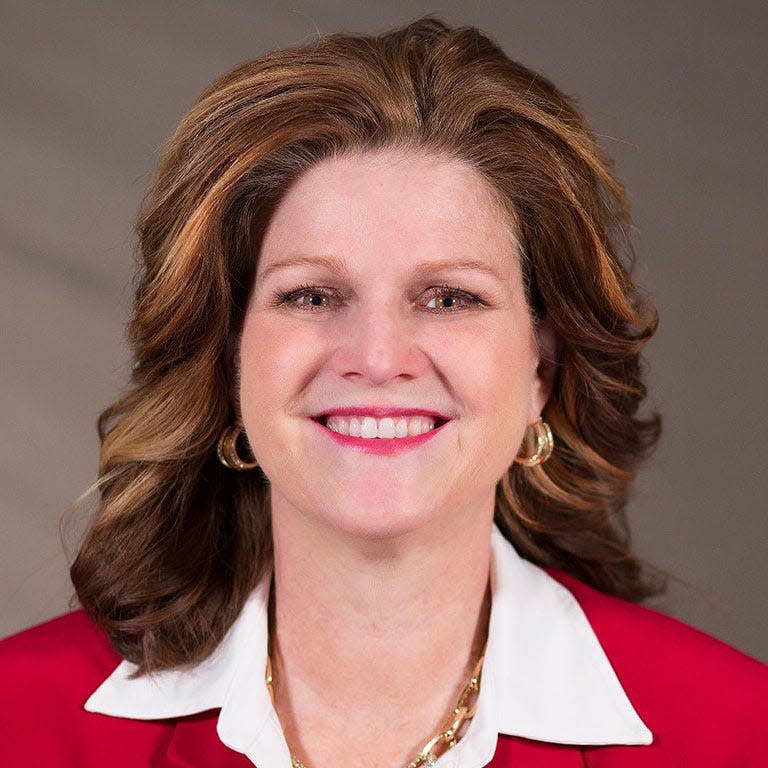
About: Rebecca "Becky" Mateja Lombardini is a 1996 graduate of IU Northwest's master of public affairs program and currently works as owner and founder of the consulting business Vision Quest. Lombardini also serves as a teacher and volunteer coach for student athletes across northwest Indiana.
Mateja Lombardini's statement:Please let me preface by suggesting to read my statement, Google me, and check my socials to get a good sense of my consistent, wise, sometimes assertive mode of operandi.
Calls for the resignation of IU President Pamela Whitten and Provost Rahul Shrivastav have intensified in recent months, with a vote of no confidence earlier this month and a rally that drew hundreds calling for Whitten and Shrivastav’s resignation or termination. What is your response to the growing dissent within the campus community? Would you advocate for any changes in approach or leadership at IU?When speaking with IU associates, especially since earning a spot on the ballot, I have asked about the situation. And with due diligence found that there are credible concerns. I would like to speak with more of the leadership to get their input. As Congressman Visclosky stated in DC, it is imperative to have the facts before making any statements or decisions and certainly no malfeasance on anyone’s part would be accepted.
Since April 25, more than 50 protesters, most of them students, have been arrested and some injured by Indiana State Police troopers. Many alumni, faculty and community members have criticized IU’s response to these student protests, saying IU/ISP needlessly escalated the situation. Do you believe the current IU administration acted reasonably? How would you encourage IU leaders to respond to future student protests?I visited Dunn Meadow during my stop at IU graduation. People have the right to peaceful protest, would prefer there be no violence on anyone’s part. I would encourage a town hall to speak to one another preventing misunderstandings.
Critics of IU’s response say a change to Dunn Meadow’s outdoor policy and the use of “structures” ought to be decided by the Board of Trustees. If elected, would you advocate for the board to review IU’s recent policy change? Would you support any amendments or revisions?I agree that these types of policy decisions be voted on by the board, a check and balance of sorts. Yes, please review and support reasonable recommendations. I did notice that there was a call for Trustee meeting recently, believe in addition to their regularly scheduled 25 page agenda one in June.
Earlier this month, the Indiana Graduate Workers Coalition went on strike for the first time since 2022, asking IU again to formally recognize the group as a union. Trustees declined to recognize the union in 2022. How would you approach discussions/negotiations with the IGWC if elected to the board?At another Sporting Event visit with my IU kids, I ran into a few graduate workers. I advocate for living wage jobs. They said more importantly they wanted a seat at the table to be involved in discussions. I think that is fair. Like Mark Cuban’s assistant I presented with at the 2022 World Leadership Conference in Puerto Rico, “Leaders learn from the past and look forward to create a better future.”
There’s been growing concern from faculty and students that IU is losing principles of “shared governance” due to some unilateral decisions from the administration that typically involve faculty input. How would you use your position as a trustee to guide a democratic approach at IU?At another visit to see IU musician Hank Ruff, I ran into many IU fans. I’d approach team play, the same way I led in athletics to get into the Indiana Basketball Hall of Fame … pursue, plan, practice, present, persuade. A chance to a fair investigation where one can rebut is vital to a proper decision.
Are there any other statements you’d like to provide about your candidacy for alumni trustee?Thank you for asking and I look forward to helping Indiana University be the best it can be for the students and community it serves. Please feel free to contact me with any comments or questions. Have a nice day and please vote Becky Mateja Lombardini for IU Trustee, June 1 – June 28, 2024.
John McGlothlin III
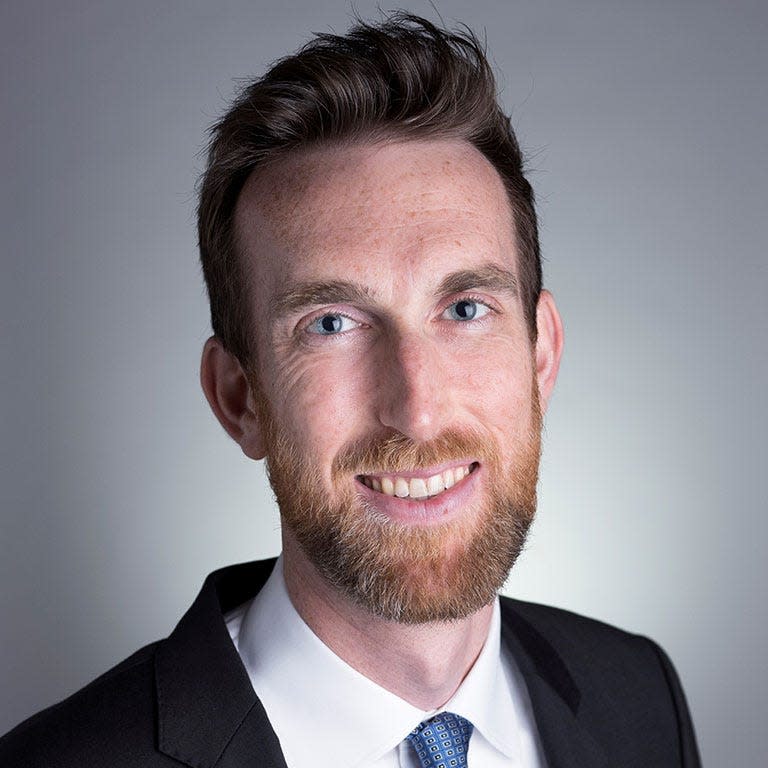
About: John McGlothlin III is a 2011 masters and 2016 Ph.D. graduate of IU and currently serves as a financial planner for Southwest Retirement Advisers in Austin, Texas. McGlothlin has emphasized his background in education accessibility, including serving on the board for Open Door Preschools, a nonprofit pre-k school in Austin, and serving as an instructor for the first-generation, first-year IU course ENG-J101.
McGlothlin's statement:
McGlothlin directed The Herald-Times to a two-page statement released on his website on May 9 for his answers. An excerpt of the letter is included below. Read the full statement on www.mcgfortrustee.com.
“In my career as a financial planner I am required to act as a fiduciary, which means I must place my clients’ interests before my own. My job, in short, centers around listening to someone when they explain what they value, need, and want. Trustees are fiduciaries as well: their job is to act in the best interests of others. And just as I must act only after listening to my clients, I believe university trustees must base their decisions upon input from faculty, staff, students, alumni, and those vested in the university’s success. Determining how best to support Indiana University and its academic mission begins here …
“… Notably, the chair of IU’s Board of Trustees, W. Quinn Buckner, responded to the IUB faculty vote in April by stating that Whitten “has my full support and that of every member of the Board of Trustees.” Buckner’s declaration indicates a yawning disconnect between current trustees and broad swathes of IU’s stakeholders. As fiduciaries, trustees must take repeated, serious grievances regarding the administration and university policies to heart, and must consider appropriate responses. Failing to do so is failing in one’s fiduciary duty, as is hastily deferring to authorities at the university or statehouse. I hold no illusions regarding the sway afforded a single trustee. But as I assert in my candidate statement, board members who are committed to acting in an organization’s best interests must be comfortable with confrontation. It would be my honor to challenge our trustees to truly hear and meaningfully respond to those voices from across the university system that have expressed such deep concerns with IU’s status quo. Specifically, I believe the board must evaluate current freedom of speech policies, the state of shared governance on campus, and—most broadly—the current administration’s capacity to act in accordance with the principles that make Indiana University a respected institution of higher learning.”
Joseph “Joe” Meek
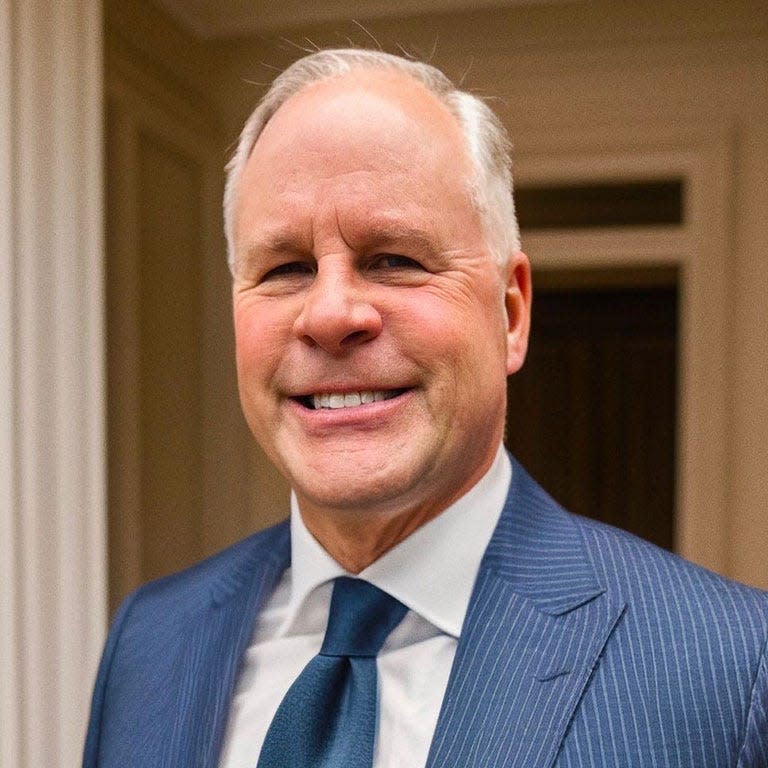
About: Joseph "Joe" Meek is a 1986 graduate and currently works as a dentist at Greenwood Smiles in Greenwood, Indiana. Meek is a member of the American Dental Association, Indiana Dental Association and the Indianapolis District Dental Society. Meek has emphasized his background as a medical professional (given IU's stature as a health leader in the state) and principles of financial frugality in his campaign.
Meek's statement:
There have been increasing calls for the resignation of President Whitten and Provost Rahul Shrivastav, with ninety percent of the IU faculty expressing 'no confidence' in their leadership. This is a significant matter that warrants careful consideration. However, before advocating for their resignation, I believe it's crucial to delve deeper into the reasons behind their decision to change policies at Dunn Meadow.
At the forefront of their responsibilities is ensuring the safety and well-being of our student body. It's possible they perceived the continued encampment as a threat to student safety, potentially disrupting the free movement of other students and posing risks of vandalism to the university. Without a more comprehensive understanding of the situation, I am withholding judgment on their future at Indiana University.
On April 25th, over 50 protestors were arrested for refusing to vacate Dunn Meadow. I have concerns regarding the swift implementation of the new rule prohibiting tents and other structures without prior IU approval. It appears there was confusion among some Indiana State Police regarding the enforcement of these guidelines. In my view, the removal of structures that had been permitted since 1969 should have involved proper notice to faculty and students before taking action.
While I strongly support the First Amendment and freedom of speech, I believe there should be agreed-upon protest guidelines to ensure the safety of both students and campus security. Additionally, I advocate for limiting protests in Dunn Meadow to IU students only, as outside influences can exacerbate potentially tense situations.
Regarding the Indiana Graduate Workers Coalition’s potential unionization, if elected to the IU Board of Trustees, I would support their right to form a union. However, any decisions regarding compensation and benefits would require thorough consideration to ensure the continued affordability of tuition for our students. As a fiscal conservative, I am committed to carefully evaluating the impact on all stakeholders before making any significant budgetary decisions.
All four of my children have been accepted and attended IU-Bloomington, with my youngest currently a freshman. I believe IU can do more to integrate incoming students into Bloomington and other IU campuses, fostering an environment where students from diverse backgrounds can come together. As a long-time season ticket holder for IU Men's basketball, I propose organizing student-only basketball games to promote camaraderie and friendship among students.
I am deeply passionate about IU, and with your support, I hope to contribute to making it an even better institution for future generations. Thank you for considering me for the IU Board of Trustees.
Christina Mendoza
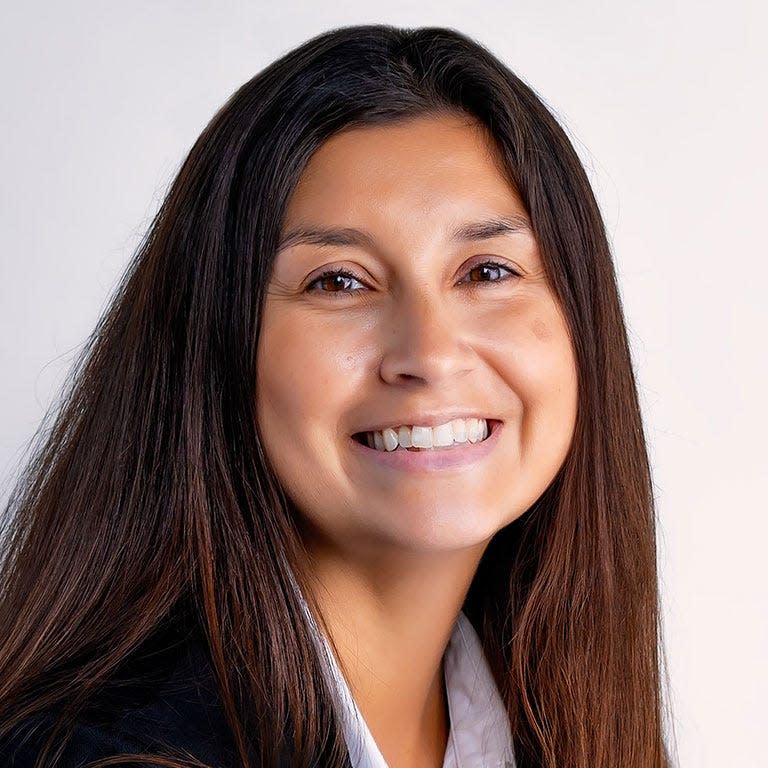
About: Christina Mendoza is a 2000 graduate and currently serves as senior executive assistant for the director of Diversity, Equity & Inclusion (DEI) at UScellular in Chicago, Illinois. Mendoza is a member of the O’Neill SPEA Alumni Board and currently serves as a mentor for The Big Shoulder Fund, which connects Chicago-area schools "with demonstrated need" to "a quality, values-based education." Mendoza has emphasized issues of diversity, equity and inclusion in her campaign.
Mendoza's statement:
If I’m elected to the board, my goal is to continue to educate myself on happenings across all nine campuses. I intend to be a good listener, have impactful conversations, ask critical questions, and always be open to new thoughts or ideas. At this moment, I feel it would be unfair for me to choose any side, as I need to learn more details to ensure I make an informed decision. After reading my candidate statement, I hope it is obvious I want to represent the voices of 90,000+ IU students, alumni, faculty and administration. Being in Chicago, the second largest alumni population outside of Indiana, I will ensure fellow alumni are informed, aware, and provided an opportunity to also impact IU.
The situation in Bloomington and numerous other college campuses is an important concern which warrants urgent attention. Please know I want what is best for IU’s entire population, and I look forward to bringing a fresh new voice to the BOT.
Jeremy A. Morris
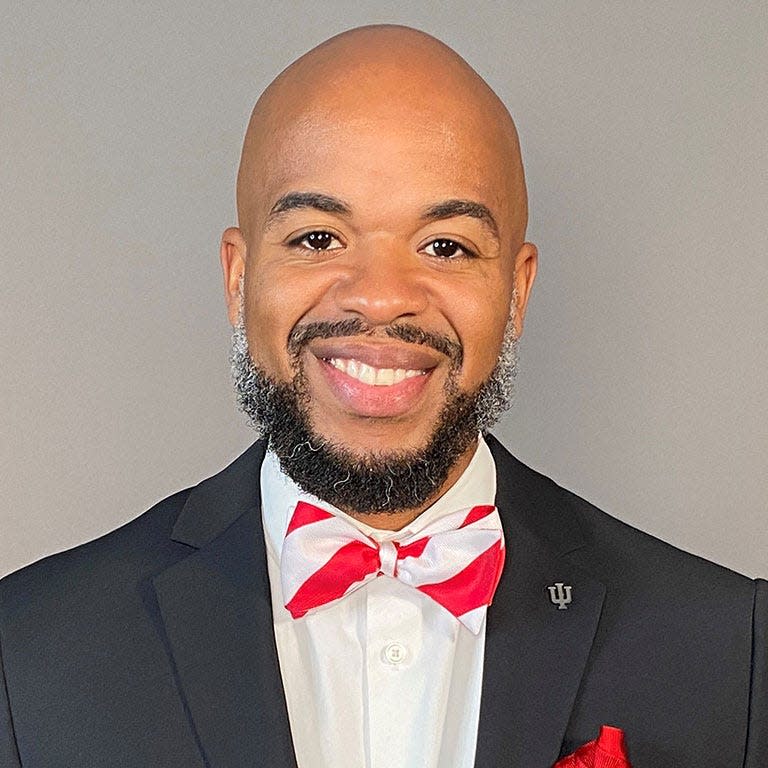
About: Jeremy A. Morris currently serves as an alumni trustee on the IU Board of Trustees and is seeking a bid for a second term. Morris serves as senior counsel for Taft Law in Indianapolis, where he practices compliance, investigations, white collar defense and commercial litigation. Morris said in a candidate statement that he hopes to focus on "initiatives to recruit and retain top faculty, expand our research endeavors, and further our engagement with the state of Indiana through economic partnerships and talent development" in his second term.
Morris could not be reached for comment after several attempts by email and phone.
Patricia Mota
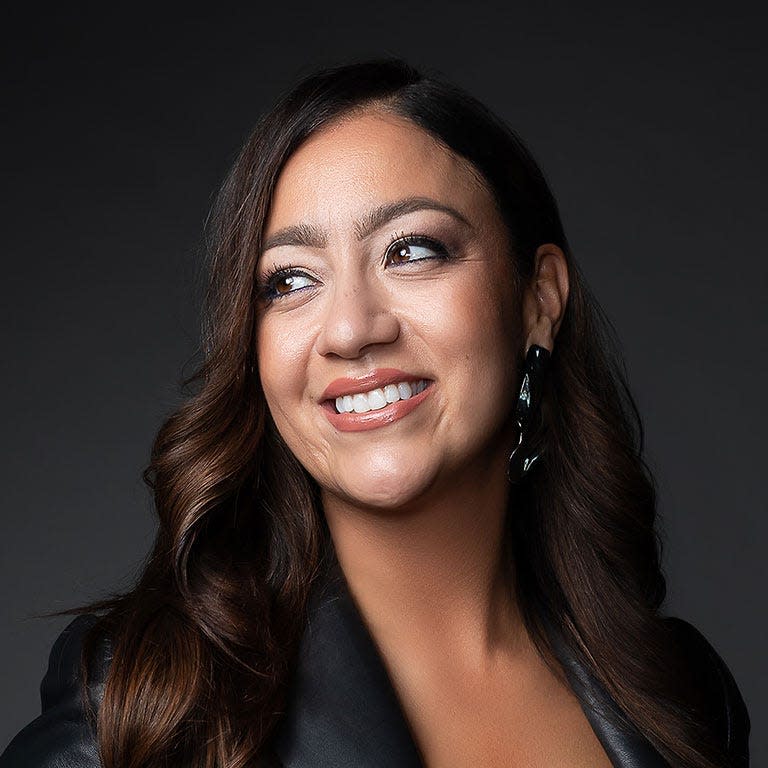
About: Patricia Mota is a 2007 graduate and currently serves as president and CEO of the Hispanic Alliance for Career Enhancement (HACE) in Chicago, Illinois. During her time in Bloomington, Mota helped to found El Centro Comunal Latino, a Bloomington cultural center that provides assistance with translation, tutoring, mentorship and cultural events. Mota is an O’Neil School of Public Affairs Distinguished Alumni Council Member and a board member for the Illinois Treasurer Charitable Trust. Mota has emphasized issues of accessibility, equity and collaboration in her campaign.
Mota's statement:
Calls for the resignation of IU President Pamela Whitten and Provost Rahul Shrivastav have intensified in recent months, with a vote of no confidence earlier this month and a rally that drew hundreds calling for Whitten and Shrivastav’s resignation or termination. What is your response to the growing dissent within the campus community? Would you advocate for any changes in approach or leadership at IU?The recent calls for the resignation of IU President Pamela Whitten and Provost Rahul Shrivastav reflect significant concerns within our campus community that cannot be ignored. The core mission of any higher education institution is to ensure the safety, well-being, and success of its students. This includes safeguarding their right to express themselves in a secure and supportive environment freely and ensuring that the university firmly condemns acts of hate and antisemitism.Given the complexity of the issues at hand, including allegations of a lack of transparency and a reactive rather than proactive approach to decision-making, it is crucial that we consider thoughtful responses. While I am not privy to all the details that have led to the current situation, the consistent themes from the dissent suggest that improvements are needed in how the university communicates and makes decisions.I would advocate for a review of the current leadership's approach to transparency, encouraging that all decisions are communicated clearly and promptly. Additionally, I support instituting regular and structured active listening sessions that genuinely reflect and address the concerns of all university stakeholders—students, faculty, staff, and alumni alike. This should be complemented by more open-discussions regarding significant concerns that include broader segments of our community to ensure that various perspectives are considered in university governance.While calling for resignations is a significant step, it is imperative that we first seek to understand all perspectives thoroughly and strive for resolutions that reinforce trust and accountability in our leadership. Only then can we consider more drastic measures if substantial improvements are not observed.
Since April 25, more than 50 protesters, most of them students, have been arrested and some injured by Indiana State Police troopers. Many alumni, faculty and community members have criticized IU’s response to these student protests, saying IU/ISP needlessly escalated the situation. Do you believe the current IU administration acted reasonably? How would you encourage IU leaders to respond to future student protests?The core function of any university, including IU, is to foster an environment where all members, particularly students, feel safe, welcomed, and valued. The recent arrests and injuries of protesters, predominantly students, following a sudden policy change on protests by the administration, raised serious concerns about whether these principles were upheld.From available information, the protests were largely peaceful. It's possible that the administration, influenced by turbulent events on other campuses, felt compelled to take preemptive actions. However, university leadership must balance best practices from across the country with equitable, thoughtful decision-making tailored to their specific context.The swift alteration of protest policies just before planned student actions, without adequate time for compliance, is particularly troubling. It's essential that rules governing conduct, especially those affecting the right to peaceful assembly, are clear, stable, and communicated well in advance. Abrupt changes can create confusion, making it seem as though students are being deliberately set up for non-compliance, which can disproportionately affect underrepresented groups.To better handle future protests, I would encourage the IU administration to focus on:- Ensure Transparency and Stability in Policymaking: Policies, especially those affecting student rights, should be consistent and communicated well before they are enacted.- Engage in Meaningful Dialogue: Leaders should proactively engage with students to understand their concerns and perspectives before conflicts escalate to the level of protests. This could also be a student-led review board that works in tandem with administration to address issues.- Apply a DEI Lens to Decision-Making: Decisions should be evaluated through a Diversity, Equity, and Inclusion lens to understand their broader implications, particularly on vulnerable groups within the community.- Prioritize De-escalation: In situations where law enforcement involvement is considered, it should be considered a last resort and always with the goal of de-escalation.
Critics of IU’s response say a change to Dunn Meadow’s outdoor policy and the use of “structures” ought to be decided by the Board of Trustees. If elected, would you advocate for the board to review IU’s recent policy change? Would you support any amendments or revisions?The swift alteration of protest policies just before planned student actions, without adequate time for a transparent process that would include input gathering, transparent discussions, announcements and, finally, compliance, is particularly troubling. It's essential that rules governing conduct, especially those affecting the right to peaceful assembly, are clear, stable, and communicated well in advance. Abrupt changes can create confusion, making it seem as though students are being deliberately set up for non-compliance, which can disproportionately affect underrepresented groups.The role of the Board of Trustees is to advise the administration on the response to events as they occur. These responses should consider external pressures, the overall safety of the students, the mission of Indiana University as it maintains an equitable approach to all issues and voices.
Earlier this month, the Indiana Graduate Workers Coalition went on strike for the first time since 2022, asking IU again to formally recognize the group as a union. Trustees declined to recognize the union in 2022. How would you approach discussions/negotiations with the IGWC if elected to the board?I commend Provost Rahul Shrivastav for the active listening approach, where he conducted 15+ listening sessions. I would encourage ongoing listening sessions with professional mediation towards an agreeable solution.
There’s been growing concern from faculty and students that IU is losing principles of “shared governance” due to some unilateral decisions from the administration that typically involve faculty input. How would you use your position as a trustee to guide a democratic approach at IU?I would ensure that the decision-making process is transparent to the extent possible, that all voices are heard while considering all possible consequences with each decision.
Are there any other statements you’d like to provide about your candidacy for alumni trustee?My candidacy for alumni trustee is deeply rooted in a professional and personal background perfectly aligned with both the immediate and long-term goals of the university and its students. My expertise resonates with the IU 2023 Strategic Plan, particularly in fostering student success and inclusivity:- Experience in Education: My tenure in higher education has been marked by creating and implementing various programs that have significantly bolstered the educational and career success of high school and college students.- Leadership and Governance: I have substantial governance experience from serving on diverse boards and councils, collaborating with local and international partners, and driving meaningful outcomes in education and beyond.- Commitment to Innovation and Community: My track record showcases a strong commitment to innovation, economic development, and active community engagement.Our students’ current and future demands call for a trustee who understands the importance of equity and inclusion. As a proven advocate for access and equity and an experienced DEI practitioner, I am dedicated to ensuring that all voices are heard and a driving force in shaping university policies. This includes taking a stand against antisemitism and promoting a safe environment where diverse perspectives thrive.Moreover, it is critical to recognize the evolving demographics of our student body. As the Latino population becomes the fastest-growing group at IU, the absence of Latina representation on the board becomes more conspicuous. My appointment would bring an essential perspective to the board at a time when understanding and addressing the needs of this significant student group is crucial, especially in the context of declining overall student enrollment in higher education.In sum, my extensive background and proactive approach to student success, equity, and governance make me the ideal candidate to navigate and address the challenges facing our university today and in the future.
Ellise Antoinette Smith
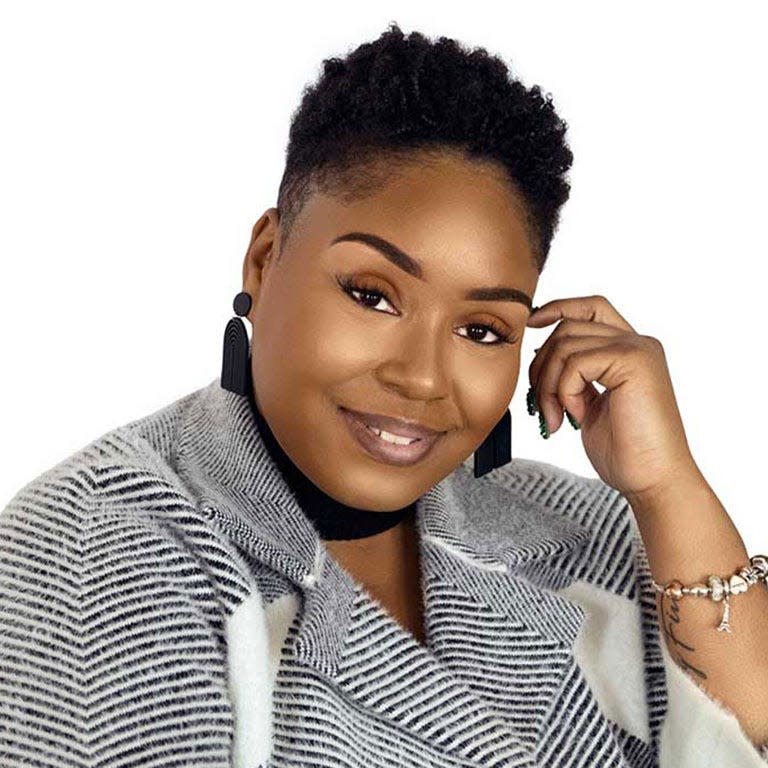
About: Ellise Antionette Smith is a 2018 graduate and currently serves as the director of Diversity, Equity, and Inclusion (DEI) for the Division of Student Affairs at IUPUI (soon to be IU Indianapolis). Smith has described herself as a "champion for DEI," and has emphasized her willingness to have tough conversations surrounding DEI issues and taking time to "understand the gaps and disconnection within our university, while creating systems that lead to a fair and just experience" in her campaign.
Smith's statement:
Calls for the resignation of IU President Pamela Whitten and Provost Rahul Shrivastav have intensified in recent months, with a vote of no confidence earlier this month and a rally that drew hundreds calling for Whitten and Shrivastav’s resignation or termination. What is your response to the growing dissent within the campus community? Would you advocate for any changes in approach or leadership at IU?These growing challenges can no longer be ignored – not by our administration, faculty, staff, students, parents, campus, or community partners. Higher education has notoriously taken ample time to make change and it has a large impact on the way we engage with each other. In our current climate, we have individuals experiencing harm and mistreatment impacting the way they navigate campus and society. IU’s leadership needs to set aside the desire to be reactive and defensive and listen to the community it has been charged to serve. In my roles as a student, associate faculty member, and staff member, simultaneously, I have had the privy to understand the unique needs of each population and earned their trust and buy-in as I have experienced some of their concerns in those roles while working to provide a solution. I often remind myself and other leaders on our campuses that we have a responsibility in our leadership to make change. We may hear things that are hard to digest, we may disagree, we may even have to make difficult decisions, but ultimately, we must make change that serves the voices that are silenced. If we do a historic review, the concerns and cries we are hearing are not new. Now is the time to move beyond lip-service and fear and lean into intentional action.
Since April 25, more than 50 protesters, most of them students, have been arrested and some injured by Indiana State Police troopers. Many alumni, faculty and community members have criticized IU’s response to these student protests, saying IU/ISP needlessly escalated the situation. Do you believe the current IU administration acted reasonably? How would you encourage IU leaders to respond to future student protests?I want to acknowledge those who were impacted by these decisions and let them know members of our university recognize the harm they experienced. It is easy to say someone deserved something when it is not happening to you, but we will never have full insight on the impacts of what they experienced. I want to remind people that when we allow fear and panic to lead our responses, it creates chaos. As a member, from multiple lens, of the IU community there was an opportunity for our administration to become intentionally engaged with the protesters to learn more. Our administration could have used this space to listen to the concerns of those involved and better understood their anticipated outcomes. As a person who has stood alongside and worked with people from multiple backgrounds, identities, beliefs, etc. there is a missed opportunity when we do not stand next to the people and listen to their needs. IU administration must recognize they stand in a place of privilege compared to those around them; they lead the direction of the college community and impact how the resources of our institution are distributed. In the future, invite students and constituents to engage in a discussion where they learn how the university leadership operates, letting them know what they can and cannot do. While explaining those roles, allow these students to express what concerns they have. I know this is possible because I have done efforts of this manner with leadership, faculty, staff, and students in my current role. During these discussions we learned where we made mistakes and how we can grow intentionally.
Critics of IU’s response say a change to Dunn Meadow’s outdoor policy and the use of “structures” ought to be decided by the Board of Trustees. If elected, would you advocate for the board to review IU’s recent policy change? Would you support any amendments or revisions?If elected to the board, I think we need to take intentional time to review this policy along with others. In my role as a director of DEI, I have implemented an equity audit review for our division’s programs, practices, and policies (P3s). This is a proactive approach to review our P3s to ensure equity issues could be addressed, especially about things we may not have put in place originally but have the opportunity to change. As trustees, we can no longer run with tradition without review. We must also move away from the idea that things are “set in stone” and cannot be shifted. It will take time to review, but the review of these policies will allow us to see where the gaps are and what we can do to shift them. It is also critical that we look at any available data and insight that can inform our decision and intentionally incorporate our university campus voices into the decision-making process. What we decide as a board today will have impact long after we are no longer serving in the role.
Earlier this month, the Indiana Graduate Workers Coalition went on strike for the first time since 2022, asking IU again to formally recognize the group as a union. Trustees declined to recognize the union in 2022. How would you approach discussions/negotiations with the IGWC if elected to the board?As a former graduate student at IU, I would approach this from an equity minded framework. As a university, we heavily rely on the graduate student workforce to engage in research, provide teaching, and continue to be the beating pulse of our institution. Graduate student workers are the lifeforce of many universities and we can no longer ignore that. Most of these students are caregivers, may not be traditional aged students, and are committed to making a fair and just society. There needs to be a review of this policy and a discussion on the value these individuals provide to IU. Without these students, we would not have the strong workforce that builds our university. There is an opportunity to seek compromise in order to provide these students with the support they need, just as they provide for our university.
There’s been growing concern from faculty and students that IU is losing principles of “shared governance” due to some unilateral decisions from the administration that typically involve faculty input. How would you use your position as a trustee to guide a democratic approach at IU?This is yet another opportunity to intentionally review policy as a collective. Our processes, procedures, policies, etc. cannot change without a collective review. Things cannot be overlooked and shifted at a whim as it breeds space inequities. We have a responsibility to follow guidelines and should not pick and choose when they enacted. As a trustee it is my goal to ask questions and not to use my position to uphold power in my favor or for personal reasons. Most boards, governances, committees, councils, etc. were created to ensure equity and fairness within an organization, we are no different. I would like to take time to review data that shows when we did violate policies and do a full review to ensure we expose bias related to experiences and topics and the impact of those outcomes. Our mission as trustees is rooted in the name, trust. If we violate those policies with no reasonable cause or because we are placing personal feelings in the process, we become part of the problem. This is our chance to rebuild trust in our governing board while taking a new approach to listen to the concerns of our constituents.
Are there any other statements you’d like to provide about your candidacy for alumni trustee?The work of the trustees must continue to be ongoing. Our work will not end once a policy is passed, when the voting ends, or when we are in the midst of a crisis. I have had the unique opportunity to be a part of the university as an alumnus, current student, associate faculty member, and staff member over the last eight years. I have been able to see the needs and concerns of multiple populations and provide opportunities for critical change. If we are going to “bring on tomorrow” we must be critical in examining what our yesterday looked like. If we will continue fulfilling our promise, we must recognize who that promise was created for. Being critical of ourselves does not mean we do not have the opportunity to do good and make change, it means we are realizing we may not have all the answers, but we will ensure we find a solution that is inclusive, intentional, and innovative.
This article originally appeared on The Herald-Times: Indiana University alumni trustee candidates share views before election

